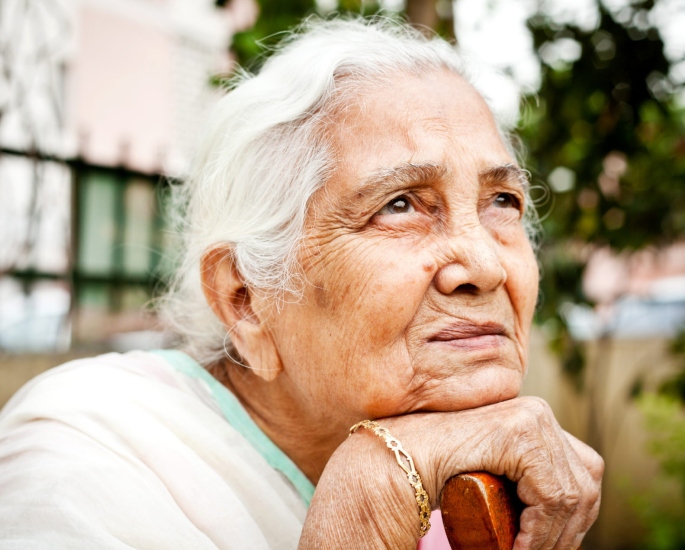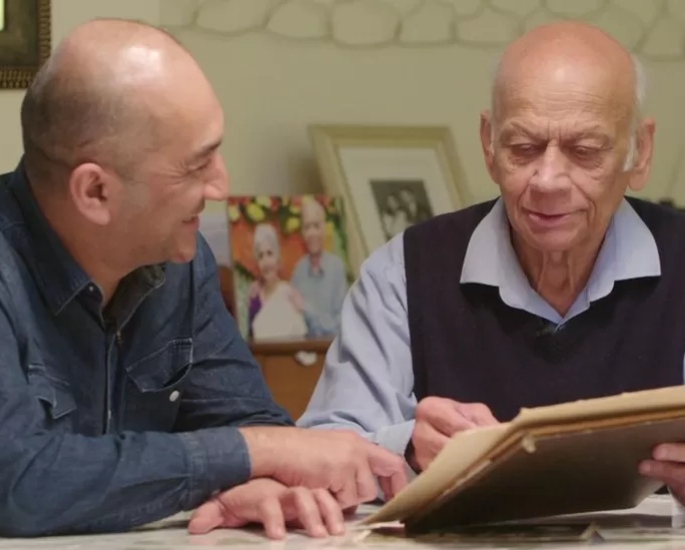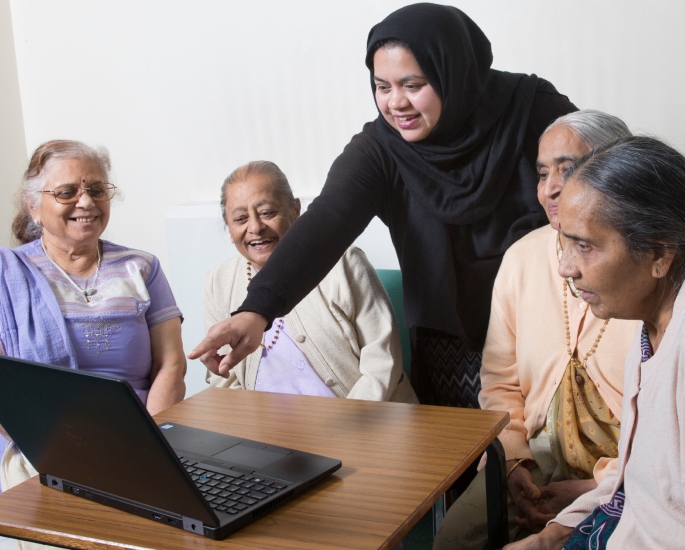"She’s struggled to accept her diagnosis"
In Britain’s multicultural society, there exists an often overlooked thread – the challenge of dementia within South Asian communities.
A startling revelation by the Alzheimer’s Society predicts a staggering 600% surge in dementia diagnoses among South Asian individuals by 2050.
This is in stark contrast to the 100% increase expected in the general UK population.
This figure prompts us to delve into a complex web of factors that contribute to this alarming statistic.
Furthermore, people of South Asian heritage in the UK are further burdened by a higher susceptibility to diseases like heart disease, stroke, and diabetes, which elevate the odds of developing dementia.
Given these risks and the fragility around dementia, many individuals still don’t seek the help they need.
Having a disease relating to your mind is often seen as shameful, or someone simply “going mad”.
But, it is this narrative that stops many British/South Asians from getting a diagnosis, let alone treatment.
How prevalent is this issue and are there ways that the ‘burden’ of getting support is finally changing?
The Signs of Dementia

Whilst most people are aware of how prevalent dementia is within different communities, the early warning signs are sometimes hard to spot.
However, in order for British Asians, and others, to get as much support as possible, it’s important to note some changes in an individual who could potentially be developing dementia.
As per the Better Health Channel, common early symptoms of dementia can vary, but they often encompass:
- Memory Problems: Especially concerning the recollection of recent events.
- Increasing Confusion: A growing sense of bewilderment.
- Reduced Concentration: A diminished ability to focus.
- Personality or Behaviour Changes: Alterations in one’s character or conduct.
- Apathy and Withdrawal or Depression: A noticeable lack of interest or withdrawal from social interaction, sometimes accompanied by depression.
- Loss of Ability to Perform Everyday Tasks: Struggling to complete routine activities that were once second nature.
Oftentimes, individuals fail to recognise that these symptoms signify an underlying issue.
They might mistakenly consider such changes as a normal aspect of the ageing process.
Additionally, the gradual and subtle development of symptoms can go unnoticed for an extended period.
Furthermore, there are instances where individuals may choose to ignore the signs, even when they acknowledge that something is amiss.
To better understand and assess these warning signs of dementia, consider the following checklist of common symptoms:
Dementia and Memory Loss:
Occasional forgetfulness is normal, but a person with dementia may frequently forget things or fail to remember them altogether.
Dementia and Difficulty with Tasks:
People may occasionally become distracted, but someone with dementia may struggle with even the simplest tasks, such as meal preparation.
Dementia and Disorientation:
A person with dementia may have difficulty navigating familiar places, experience confusion about their location, or even believe they are in a past time in their life.
Dementia and Language Problems:
While everyone may occasionally struggle to find the right word, a person with dementia might forget simple words or use inappropriate substitutes, making their speech hard to comprehend.
They may also have difficulty understanding others.
Dementia and Changes in Abstract Thinking:
Managing finances can be challenging for anyone.
But for a person with dementia, understanding numbers and their implications may become increasingly problematic.
Dementia and Poor Judgement:
Everyday activities requiring good judgment may pose difficulties for those with dementia, such as making appropriate clothing choices in cold weather.
Dementia and Poor Spatial Skills:
Individuals with dementia may find it hard to judge distances or directions, even when driving.
Dementia and Misplacing Things:
Temporarily misplacing items like wallets or keys is common, but a person with dementia may not recognise these objects or their purposes.
Dementia and Mood, Personality, or Behaviour Changes:
While everyone experiences occasional mood swings, someone with dementia can exhibit rapid and unexplained mood shifts.
They may become confused, suspicious, or withdrawn, and some may display disinhibited or outgoing behaviour.
Dementia and Loss of Initiative:
It is normal to occasionally lose interest in certain activities.
However, dementia can lead to a person’s disinterest in previously enjoyed pursuits or necessitate external cues to engage in them.
It is crucial to note that numerous medical conditions can manifest similar symptoms to dementia.
Thus, it is essential not to automatically assume dementia based solely on the presence of some of the aforementioned symptoms.
Conditions such as strokes, depression, prolonged alcohol abuse, and brain tumours can all exhibit dementia-like symptoms, many of which are treatable with medical intervention.
The Issue with Dementia being a Taboo

Even though there are plenty of resources, both physical and online, to understand the early signs of dementia, most British and South Asians still don’t seek any help.
As reported before, the number of British/South Asians living with dementia in the UK is set to increase by 600% by 2050.
It has also been stated these individuals are “less likely to get an early or ‘timely’ diagnosis, less likely to access treatment, and less likely to receive support when diagnosed”.
This is due to the “totally inadequate” system that was set up many years ago to cater for a predominantly white population.
However, it isn’t just the system that is forcing these communities to stop seeking help.
It’s also the stigma related to having a mental health issue, as well as trying to seek help for said problems.
Interestingly, Punjabi ranks number three as the most spoken language in the UK, however, it doesn’t have a word for dementia.
The same goes for Urdu, Hindi, Gujarati and other South Asian languages.
Unsurprisingly, it means thousands of families, especially those who don’t speak English well, feel they can’t speak to anyone who will understand them.
Upon reflection, Jabeer Butt, Chief Executive of the Race Equality Foundation expressed to The Guardian in 2022:
“It’s unacceptable that in 2022, South Asian communities are having worse experiences with dementia simply because of prehistoric systems and support.
“South Asian people are more likely to receive their dementia diagnosis at a later stage, limiting their access to treatment.
“Most cognitive tests used to diagnose dementia have been validated and tested in English, with a strong bias for Western culture, language and education.”
The main component of why British Asians don’t seek support or help for dementia is the fear of embarrassment and the misunderstanding of these issues within communities.
Kate Lee, the Chief Executive of the Alzheimer’s Society charity, also explained to The Guardian:
“For anyone with dementia symptoms, getting a timely diagnosis is crucial – only then can they get access to vital treatments and support.
“But people in the South Asian community have told us the worrying reality is that stigma and taboo are often deterring families from getting support.
“Living without a dementia diagnosis can be dangerous, with people ending up in crisis situations.”
“Yes, a diagnosis can be daunting but it’s better to know – nine in 10 people with dementia have said that they benefited from getting diagnosed.”
The imperative to raise awareness and knowledge about dementia within South Asian communities is a necessity for the promotion of culturally sensitive services.
Going beyond the surface-level of stigma associated with this problem, British Asians can also suffer from social isolation, problematic diagnosis and lack of care facilities.
Dementia Among the British Asian Public

Whilst there have been a lot of British Asians who have opened up about their own cases with dementia, many high-profile British Asians have also come forward with their stories.
One of the main elements that is highlighted in these different accounts is the lack of openness to talk about these issues.
Perhaps one of the most groundbreaking testimonies was from British Asian actress Shobna Gulati.
Known for her roles in Coronation Street and Dinnerladies, Shobna told Alzheimer’s Research of her mum’s story in 2019:
“The first sign that something was wrong was when mum’s normal character seemed to dial up a few notches.
“At first our arguments would seem different, lasting for days rather than hours. I’d anguish over what I’d done so wrong to upset her.
“She’d get confused when out in the car, even though she’d lived in the area her whole life.
“I vividly remember one day mum came to pick me up from the set of Coronation Street, which she knew so well.
“But she got lost for two hours trying to find me, with no mobile phone.
“Now, of course, she doesn’t drive and giving up that part of her independence was tough to negotiate in the beginning.
“Mum is a headstrong lady and looking back, she covered the cracks for about three years before her diagnosis.
“None of us knew much about dementia before that. But when the diagnosis came, it was there in black and white: vascular dementia.
“Caring for mum is a family affair – split between me, my brother, one of my sisters and my son Akshay, with caring support from a family friend.
“There’s also great support from the local health authority and district nurses.
“Between us, we’ve learnt the art of patience and negotiation, and the value of information.
“There is so much stigma about dementia, particularly in South Asian communities.
“This weighs strongly on mum and to this day, she’s struggled to accept her diagnosis.
“We watch mum trying, and failing, to come to terms with the idea of dementia. And that’s heartbreaking.
“Because it’s been less painful for her to shy away from the perceived stigma of the diagnosis than to share it, and that’s where things need to change for future generations.
“Vascular dementia has definitely made mum more socially isolated, and more and more of today’s older generation is facing this future.
“It’s also isolating for carers, like me and my siblings.
“In our community it’s normal for everyone to know everyone else’s business, it’s a very social affair.
“But when you’re struggling to cover cracks in normal life, it can create a real social pressure.”
“Talking about dementia, and the value of research, is vital. It’s such an important way to break down these stigmas.
“If we can talk about dementia and share experiences without judgement or taboo, we can create support systems and help people contribute for longer within society.
“We can also help people accept that they might be changing and adapt the world to make their lives easier.”
Likewise, BBC presenter Rajan Datar wrote a personal account of his father’s diagnosis of dementia in 2019. In his story, he explained:
“South Asians are also more prone to diabetes, high blood pressure and hypertension, which means they are more likely to develop vascular dementia.
“But there has also been a stigma surrounding dementia within the community that has stopped people seeking diagnosis and help.
“Significantly, there is no word for dementia in most Indian languages – instead it translates as a ‘mad’ person.
“My own dad said he didn’t go to the doctor initially because he ‘didn’t want to waste their time, they’re busy enough as it is’.
“When he did, he was asked to name 10 animals as part of a memory test – and was able to recall only two.
“According to one study, a third of elderly South Asians do not speak English and many prefer the sanctuary of temples or mosques to approaching care and health services.”
Among his evocative story, Rajan also noted a specific case regarding Charan Kaur Heer.
Her husband passed away from dementia in 2011 and Rajan explained Charan is now in the advanced stages of her own diagnosis.
Included in Rajan’s recollection were the words of Charan’s daughter, Manjeet Heer, a police constable in London.
Manjeet explains that her mother “does get very depressed” and she has said that “she’s just waiting to be taken”.
Charan’s grandson, Ryan Sangar, is her primary carer but as he does not speak Punjabi, his aunt must help translate over the phone each time a care service member visits.
In the post, Manjeet explains that the NHS needs to take into account language barriers and different cultures.
Furthermore, Alzheimer’s Society member and contributor, Dr Karan Jutlla, also opened up about her father’s dementia to the charity.
In her own words, she talks about the lack of awareness from her own community and how it contributes to the wider stigma of dementia:
“Sadly, my father developed alcohol-related dementia in the later years of his life, following the tragic loss of my brother.
“Whilst my mother worked to keep us afloat, I had sole responsibility of his care.
“His illness was not understood by members of our family and, our community and were often interpreted as a ‘loss of mind’ or ‘madness.’
“This lack of understanding made me feel very alone in my experiences – just like dementia, alcoholism was not a recognised condition amongst the community.”
Some of Dr Jutlla’s words resonate with other victims of dementia.
One individual is Bhagwant Sachdeva, from Wolverhampton, who spoke with The Guardian in 2022 about her journey with the problem:
“It was about four years ago that I first had a feeling something wasn’t right with me.
“At my community group, I kept forgetting the other ladies’ names, losing my train of thought, or saying the wrong thing.
“They would say to me: ‘you’re going pagal’ [mad].
“They didn’t mean it. It’s just a habit in our society to respond that way and say that someone is losing their mind.”
Whilst doctors confirmed that the former teacher has Alzheimer’s, Sachdeva said she was “relieved” at the revelation.
She said that she could now explain the symptoms to her friends:
“I don’t hide my diagnosis from anyone, and I have no problem telling people about it.
“It’s allowed me to access medication to help me live well with dementia, raise awareness in my community, and feel understood.”
Although faced with an uphill task of dealing with her own Alzheimer’s, Sachdeva personifies the most crucial factor needed in relation to British Asians and dementia – to talk.
It’s this lack of discussion that often leads to more serious cases such as Dr Kamel Hothi’s uncle.
Dr Hothi, special adviser to the Queen’s Commonwealth Trust and Alzheimer’s Society ambassador revealed:
“As a family, we didn’t speak about it, so we didn’t spot the signs sooner and this denied him access to the support and help available.
“A diagnosis can be daunting, but it’s better to know and as a community, we need to step up for our loved ones, stop the stigma and act on the first signs of dementia.”
We can see how these stories emphasise the role British Asian communities need to have in normalising dementia, and mental health issues in general.
Moreso, it illustrates the need for more resources so individuals feel safer to seek help.
These accounts show that some sufferers aren’t stopped seeking support for dementia directly, but rather indirectly, from outdated perceptions and a lack of cultural awareness of certain services.
Combatting the Taboo

In order to help more British Asians get help and to slowly eradicate the taboo of dementia, Dr Jautla outlined the initial steps that need to be taken.
She highlights that although there are no “specific stats” on South Asians with dementia in the UK, the research still suggests there will be “an increase in cases within this community”.
She goes on to emphasise:
“Memory test questions are often geared to people who have lived in the UK all their lives.
“Often, English isn’t the first language for a lot of older people from a South Asian background.
“Translation services are also scarce.
“I’ve heard about care agencies muddling up South Asian languages, leaving families feeling isolated, anxious about finding the right care, and depressed.
“Culturally aware services suited for different languages are desperately needed.”
“That means investment in the health system to ensure people from every community can get an accurate, early diagnosis.
“Until you get a diagnosis, you can’t get support. So I can’t stress enough just how important diagnosis is.”
In further research from the Alzheimer’s Society, they found that out of 1019 people with dementia, 42% confused dementia symptoms with getting old.
Additionally, “26% took more than two years to get a diagnosis”.
But one way in which the charity is trying to combat this is through its new campaign for Dementia Action Week.
In order to increase diagnosis rates, they’ve produced specific information for members of the Punjabi-speaking community.
In addition to this, as per The Independent, the NHS launched an awareness campaign in 2023 following criticism about a lack of support for minority patients.
The announcement followed a report which found thousands of South Asians in the UK with dementia are met with “outdated health services designed for white British patients”.
The campaign is also supporting NHS staff with new tools to improve patients’ experiences, as well as developing their own knowledge of ethnic communities.
Staff will also be encouraged to complete a new module developed by NHS England and the Royal College of Psychiatrists.
Finally, West Sussex County Council is also taking a proactive approach by offering a day support service, strategically designed to cater to the unique needs of this community.
These services can significantly slow down the deterioration of physical and mental functions, thereby enabling individuals to retain their independence and stay in their homes for longer.
It also offers much-needed respite for family carers, who often find themselves juggling caregiving with their own responsibilities and careers.
It becomes abundantly clear that addressing the stigma and reluctance to seek help is paramount.
There is an argument that British Asians are stopped from seeking help for dementia, especially because of the lack of resources and understanding of the topic.
Also, the unfair judgment on having mental health issues is another element that vitally needs addressing.
The revelation that South Asian individuals in the UK are at a significantly higher risk of developing dementia is a stark reminder of the pressing need for action.
This is an opportunity to break the chains of stigma and forge a path where dementia is no longer a taboo but a challenge met with empathy, and culturally sensitive support.
If you are or know anyone seeking support for dementia, reach out for help. You are not alone:
- Dementia UK – 0800 888 6678
- Alzheimer’s Society – 0333 150 3456
- Age UK – 0800 678 1602






























































